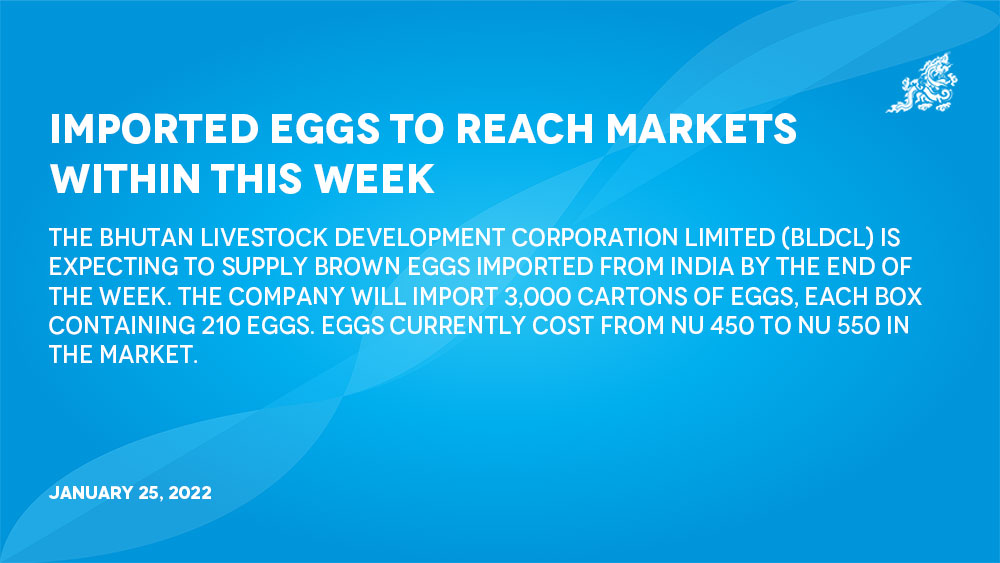Chhimi Dema
The Bhutan Livestock Development Corporation Limited (BLDCL) is expecting to supply brown eggs imported from India by the end of the week.
The company will import 3,000 cartons of eggs, each box containing 210 eggs. Eggs currently cost from Nu 450 to Nu 550 in the market.
The BLDCL will make the eggs available for Nu 285 to Nu 305 per tray, depending on the location of the dzongkhags.
An official from the company said that advance payments were made to a dealer in Kolkata. “We are pressuring them to deliver at the earliest.”
The egg import is an interim measure to address the shortage in the market after contamination of feed affected 485,245 layer birds, causing daily egg production to drop from 382,490 eggs to 120,723 eggs.
Import clearance from the Bhutan Agriculture and Food Regulatory Authority and the “blackout” delaying the advance payment has slowed down the import facilitation, the official said.
Another reason for the delay in receiving the eggs was a festival in Tamil Nadu.
The company initially talked with a dealer from Tamil Nadu, but the festival has delayed the import and the company wasn’t informed about the festival, the official said.
The company talked with the Department of Livestock and it was informed that the layer birds have started producing eggs again.
“Egg import will depend on the market situation and production from the poultry farms in the country,” the official said.
Records from the Department of Agricultural and Marketing Cooperatives (DAMC) show that from January 20 until yesterday, 236 metric tonnes of vegetables and fruit were imported into the country and distributed in the zone markets and shops.
The produce was imported from India by the wholesalers at the Centenary Farmers’ Market, facilitated by DAMC.
Vegetables such as onions, tomatoes, and cabbages were imported.
A total of 114.66 metric tonnes (MT) of chilies were imported by the Food Corporation of Bhutan Limited from January 7 to January 22.
The import was to “ensure availability, stabilise prices, and curb illegal import”, according to the Ministry of Agriculture and Forests.
The record posted on the ministry’s Facebook page shows that from the Phuentsholing distribution hub, 77.71MT was distributed to Thimphu, Chukha, and Samtse.
From Thimphu, a secondary distribution hub, 33.42MT, 4.28 MT, 0.88MT, 1.60MT, and 2.64MT were distributed to Thimphu, Paro, Haa, Wangdue, and Punakha respectively.
Gelephu’s distribution hub catered to Bumthang, Trongsa, Zhemgang, Tsirang, Sarpang, and Dagana. The Samdrupjongkha hub distributed to Lhuentse, Mongar, Trashiyangtse, Pemagatsel, and Trashigang.


